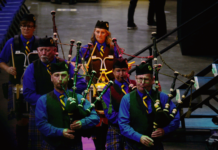The UCR School of Medicine is poised to be the pride and heart of UCR’s future. The tumultuous accreditation process did not stop administrators, students and community members from building the School of Medicine, but its purpose is far from being completed. Now that it has secured funding, Dr. G. Richard Olds faces the task of carrying out the school’s unique missions and establishing UCR as the university by the community, for the community.
Dean Olds graduated from Case  Western Reserve University School of Medicine. He specialized in infectious diseases and went on to teach at Brown University and in 2000, became a professor and chair of medicine at the Medical College of Wisconsin. In 2010, Olds was hired as the founding dean and vice chancellor of health affairs for the University of California, Riverside School of Medicine.
Western Reserve University School of Medicine. He specialized in infectious diseases and went on to teach at Brown University and in 2000, became a professor and chair of medicine at the Medical College of Wisconsin. In 2010, Olds was hired as the founding dean and vice chancellor of health affairs for the University of California, Riverside School of Medicine.
Olds had more than enough positions open to him, so why did he choose to come to Riverside? Because he had a belief. A belief that he could help create a new kind of medical school that would be capable of addressing the medical problems of the future, not just the medical issues of today.
Dean Olds drew plenty from his past experiences working as an infectious diseases physician in third-world countries. The first-hand experience he gained working with patients in Costa Rica, China and the Philippines opened his eyes to the pitfalls of the American healthcare system. His time there strongly influenced the ideas he now has for the UCR School of Medicine.
For instance, a medical school’s primary job is to educate and train quality physicians, but Dean Olds believes some medical schools have lost sight of that goal. In the pursuit of federally funded research and various other accolades, some medical schools in this country have forgotten that their priority should be to put out great doctors. In order to obtain great doctors, he says time, money and effort has to be invested into good students. This philosophy is central to Dean Olds’ community pipeline programs. These programs will reach out to K-12 students, undergraduates and postgraduates, in hopes of strengthening the pool of future medical school applicants.
The UCR School of Medicine is based on a community-based model, which is common along the East Coast. Therefore its arrival at UCR is not just a first for the campus, but for the entire West Coast.
The community-based model is unique because it stresses cooperation over competition. Local hospitals and clinics will serve as learning centers for UCR’s medical students, while local physicians will be recruited as teachers for the school. This is all part of an ingenious plan to improve the quality of current health care in the Riverside community by forcing physicians to be on top of their fields.
More importantly, the dean emphasized the kinds of students that the medical school is looking for. “We should have physicians that come from our communities, because they can do something that I can’t do…they understand the patient from a different perspective.” He went on to stress the importance of selecting med school students on other criteria besides high academic scores. While a high GPA and MCAT score are strong indicators that an applicant is competent enough to pass the academic rigor of medical school, no test score can guarantee whether or not an applicant will make a good doctor.
The UCR medical school is not only important to the community, but to the country. Its innovative educational model and community-based ties make it the ideal med school for the 21st century. “We artificially, in this country, have separated wellness into schools of public health and illness into medical schools,” argues Dean Olds. “We need a little more merging of those.”
“We need to be advocates as physicians, not just for the health of our individual patients, but for the health of our communities. And that’s a different kind of doctor than we’re currently training today and that’s the kind of doctor that we want to train.”
As Dean Olds enthusiastically describes his A-list administrative team, he mentions employees that left their old posts and risked their established professional careers all because they also believed in the Dean’s vision. From senior associate dean Raul Ruiz, recent congressman elect, to Emma Simmons, a former dean at Brown University, I realize that the people in the offices surrounding me are all at the heads of their fields. In the words of Dr. Olds, “How do you get any better than a team like that?”
Dean Olds cites his father as his main inspiration for coming to Riverside. Olds’ father was the chancellor of Springfield College in Massachusetts. As head of the college in 1964, his father offered an honorary degree to Martin Luther King Jr. in spite of the controversy at the time. The dean describes the inspirational life of his father, a man who had an important past with MLK and went on to restore Alaska Pacific University, making it the first bankrupt university in the United States to close and then re-open.
Looking to his father as a role model, Olds says, “If it’s worth doing, if you really believe that it’s something that needs to be done, the fact that it’s going to be hard, the fact that people think you’re nuts, the fact that people are telling you a million reasons why you shouldn’t do it; it’s still worth doing it…because you have to believe in what you’re doing.”
The UCR School of Medicine is more than ready to take on the future of a changing health care system and a changing America. With Dean Olds heading the new school, there are no limits to the things Riverside students can accomplish. The dean came to Riverside with this same belief and recipe for success: “It was an opportunity to do something different, something that I believe is better for our country. And if I’m right, then 20 or 30 years from now everybody will be doing what we’re doing…That’s a unique opportunity to actually build a school on a different idea or a different concept and if we can succeed, we’ll change everyone else. And you don’t get many chances to do that.”








